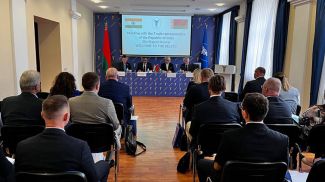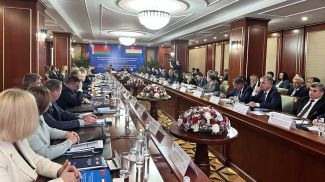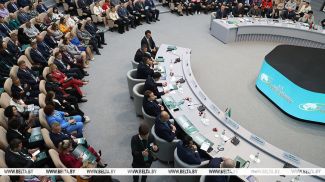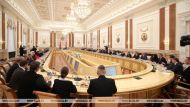MINSK, 1 June (BelTA) – The accomplishment of sketched-out plans and the raising of living standards of the population depend a lot on how much the economy can adapt to the current situation. Belarusian Deputy Economy Minister Tatiana Brantsevich made the statement at the seminar hosted by the Parliamentary Assembly of the Union State of Belarus and Russia in Minsk on 1 June to discuss the main directions of development of social and labor relations in Belarus and Russia, BelTA has learned.
Tatiana Brantsevich said: “In conditions of the sanctions-fuelled pressure on Belarus the government pays most of the attention primarily to the uninterrupted work of enterprises, to the preservation of worker collectives, and to the raising of salaries on the basis of higher labor productivity. At the same time prompt measures are being taken to keep up living standards of the population. In the current conditions the fulfillment of sketched-out plans and higher living standards of citizens depend a lot on how much the economy can adapt to the current situation, rebuild the existing economic ties, and explore new activity areas.”
In her words, the government's economic policy pays close attention to the development of the regions, to raising the appeal of life, work, business, and territories located outside the country's capital city and the oblast capitals, to popularizing the rural way of life. “In small towns and medium-sized cities we will focus on developing competences and raising investments in new manufacturing enterprises. The realization of regional projects contributes to the creation of new jobs and respectively to higher earnings of the population,” the deputy economy minister stressed.
Tatiana Brantsevich mentioned small and medium private enterprises, which develop dynamically and are well-represented in the national economy. She noted that systemic measures would be taken in the future in order to improve business operation terms in Belarus and encourage citizens to engage in entrepreneurship at a higher organizational level.
The seminar gathered members of the Parliamentary Assembly of the Union State of Belarus and Russia as well as representatives of the relevant ministries and government agencies of Belarus and Russia, scientific and educational institutions, the Federal Agency for Youth Affairs, the Belarusian youth union BRSM, and members of the Youth Chamber under the Parliamentary Assembly of the Union State of Belarus and Russia.












